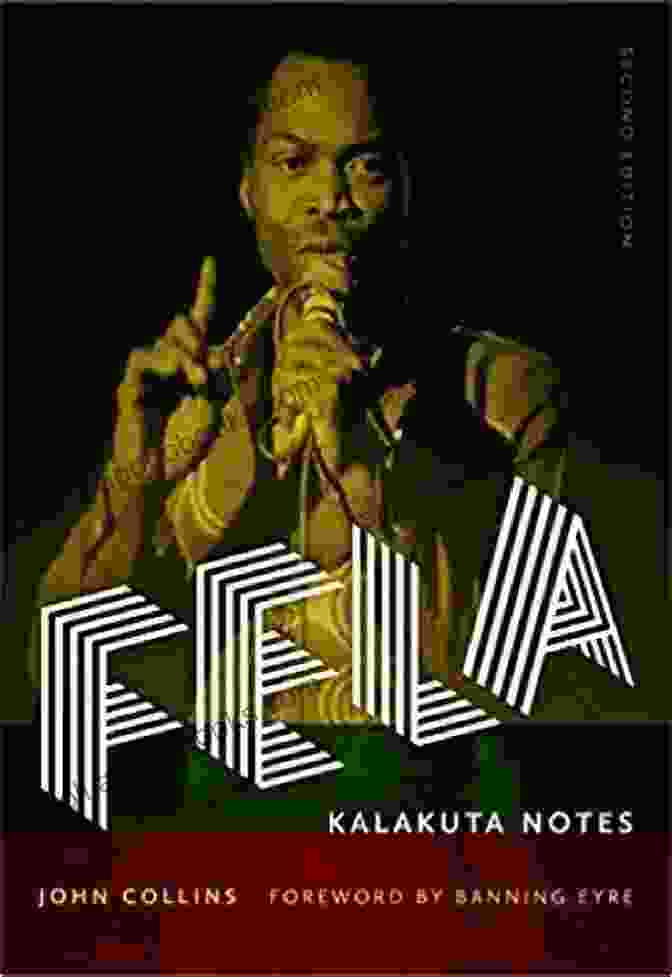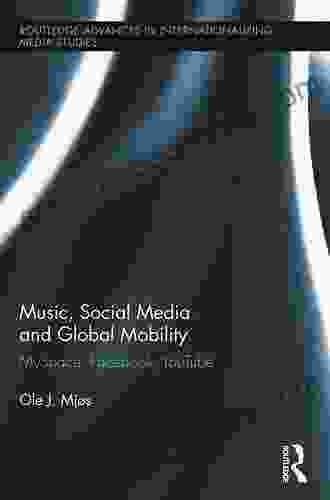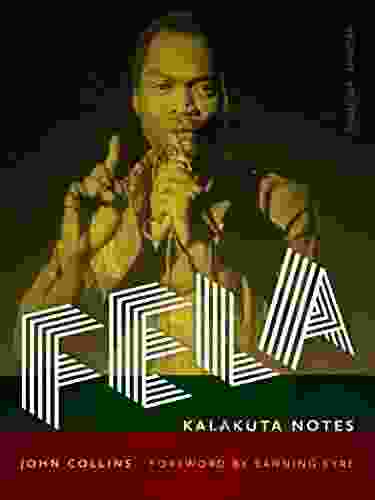Fela Kalakuta Notes: A Journey into the World of Music, Activism, and Freedom


5 out of 5
| Language | : | English |
| File size | : | 35993 KB |
| Text-to-Speech | : | Enabled |
| Screen Reader | : | Supported |
| Enhanced typesetting | : | Enabled |
| Word Wise | : | Enabled |
| Print length | : | 335 pages |
| Lending | : | Enabled |
Fela Kalakuta was a Nigerian musician, activist, and Pan-Africanist who is considered one of the most influential figures of the 20th century. His music, which he called Afrobeat, was a fusion of traditional African rhythms with jazz, funk, and soul. Fela's lyrics were often politically charged, and he used his music to speak out against corruption, oppression, and injustice.
Fela Kalakuta Notes is an in-depth exploration of the life and work of this legendary artist. The book takes readers on a journey through Fela's life, from his early days as a jazz musician to his rise to fame as the pioneer of Afrobeat, his political activism, and his exile and eventual return to Nigeria. Through interviews with Fela's family, friends, and collaborators, as well as an analysis of his music and lyrics, Fela Kalakuta Notes provides an unprecedented look into the mind of one of the most influential figures of the 20th century.
Fela's Early Life and Career
Fela Kuti was born in Abeokuta, Nigeria, in 1938. His father was a prominent musician and activist, and his mother was a devout Christian. Fela grew up in a musical environment, and he began playing the piano at an early age. He later studied classical music and jazz at the Trinity College of Music in London.
In the early 1960s, Fela returned to Nigeria and formed his own band, Koola Lobitos. The band's music was a fusion of traditional African rhythms with jazz and funk. Fela's lyrics were often politically charged, and he quickly became known for his outspoken criticism of the Nigerian government.
The Rise of Afrobeat
In the late 1960s, Fela developed a new musical style that he called Afrobeat. Afrobeat was a more complex and sophisticated sound than Koola Lobitos' music. It featured longer songs with intricate arrangements and complex rhythms. Fela's lyrics also became more politically charged, and he began to use his music to speak out against corruption, oppression, and injustice.
Afrobeat quickly became popular in Nigeria, and Fela became one of the most popular musicians in the country. He also began to tour internationally, and he soon gained a following in Europe and North America.
Fela's Political Activism
Fela's music was always political, but he became increasingly involved in activism in the 1970s. He founded the Kalakuta Republic, an independent community in Lagos, Nigeria. The Kalakuta Republic was a haven for musicians, artists, and activists, and it became a symbol of Fela's resistance to the Nigerian government.
Fela was also a vocal critic of the military dictatorship that ruled Nigeria in the 1970s and 1980s. He was arrested and imprisoned several times, and his music was banned from the radio. However, Fela never stopped speaking out against injustice, and he continued to use his music to inspire people to fight for their rights.
Fela's Exile and Return
In 1977, Fela was arrested and charged with treason. He was sentenced to 10 years in prison, but he was released after 20 months due to international pressure. Fela went into exile in Ghana, where he continued to record music and speak out against the Nigerian government.
In 1984, Fela returned to Nigeria. He was welcomed back as a hero, and he continued to perform and record music until his death in 1997.
Fela's Legacy
Fela Kuti was one of the most influential musicians of the 20th century. His music was a powerful force for social change, and he inspired people all over the world to fight for their rights. Fela's legacy continues to live on through his music, his activism, and his spirit of resistance.
Fela Kalakuta Notes is an essential read for anyone who wants to learn more about the life and work of this legendary artist. The book provides an in-depth exploration of Fela's music, his activism, and his legacy. Fela Kalakuta Notes is a must-read for fans of Fela Kuti, students of African
5 out of 5
| Language | : | English |
| File size | : | 35993 KB |
| Text-to-Speech | : | Enabled |
| Screen Reader | : | Supported |
| Enhanced typesetting | : | Enabled |
| Word Wise | : | Enabled |
| Print length | : | 335 pages |
| Lending | : | Enabled |
Do you want to contribute by writing guest posts on this blog?
Please contact us and send us a resume of previous articles that you have written.
 Book
Book Novel
Novel Page
Page Chapter
Chapter Text
Text Story
Story Genre
Genre Reader
Reader Library
Library Paperback
Paperback E-book
E-book Magazine
Magazine Newspaper
Newspaper Paragraph
Paragraph Sentence
Sentence Bookmark
Bookmark Shelf
Shelf Glossary
Glossary Bibliography
Bibliography Foreword
Foreword Preface
Preface Synopsis
Synopsis Annotation
Annotation Footnote
Footnote Manuscript
Manuscript Scroll
Scroll Codex
Codex Tome
Tome Bestseller
Bestseller Classics
Classics Library card
Library card Narrative
Narrative Biography
Biography Autobiography
Autobiography Memoir
Memoir Reference
Reference Encyclopedia
Encyclopedia Britta Wulf
Britta Wulf Eivor Martinus
Eivor Martinus Bj Gallagher
Bj Gallagher Jessie Daniels
Jessie Daniels Brodi Ashton
Brodi Ashton Bridget E Baker
Bridget E Baker Brian Turner
Brian Turner Torkom Saraydarian
Torkom Saraydarian Libby Woodfin
Libby Woodfin Richard Faulk
Richard Faulk Bron James
Bron James Bodie Thoene
Bodie Thoene Stephanie Wood
Stephanie Wood Jeremy Black
Jeremy Black Bianca Blythe
Bianca Blythe Brian Kayser
Brian Kayser Karen Anne Golden
Karen Anne Golden Brad Stetson
Brad Stetson Sunny Hostin
Sunny Hostin China Dennington
China Dennington
Light bulbAdvertise smarter! Our strategic ad space ensures maximum exposure. Reserve your spot today!

 Randy HayesThe Beano Presents Dennis The Menace And Gnasher: The Ultimate Guide to the...
Randy HayesThe Beano Presents Dennis The Menace And Gnasher: The Ultimate Guide to the... Sidney CoxFollow ·19.5k
Sidney CoxFollow ·19.5k Larry ReedFollow ·7.5k
Larry ReedFollow ·7.5k Oscar BellFollow ·13.8k
Oscar BellFollow ·13.8k William ShakespeareFollow ·8.6k
William ShakespeareFollow ·8.6k Mark MitchellFollow ·10.5k
Mark MitchellFollow ·10.5k Hugh BellFollow ·11.2k
Hugh BellFollow ·11.2k Edward BellFollow ·6.2k
Edward BellFollow ·6.2k Virginia WoolfFollow ·9.5k
Virginia WoolfFollow ·9.5k

 Corey Green
Corey GreenHuman Geography: A Concise Introduction by Gilbert...
A Journey into the Dynamic Realm of...

 Julian Powell
Julian PowellTrain Your Mind to Make Great Art a Habit
Do you dream of...

 Matthew Ward
Matthew WardSmall Town Romance: Heart Compass
Escape to Willow Creek, Where...

 Neil Parker
Neil ParkerMusic, Social Media, and Global Mobility: Exploring...
: The Convergence of Music, Media, and...

 Seth Hayes
Seth HayesUnlock the Potential of Potential Theory with Brooke...
Embark on an...
5 out of 5
| Language | : | English |
| File size | : | 35993 KB |
| Text-to-Speech | : | Enabled |
| Screen Reader | : | Supported |
| Enhanced typesetting | : | Enabled |
| Word Wise | : | Enabled |
| Print length | : | 335 pages |
| Lending | : | Enabled |












